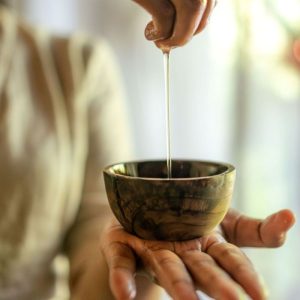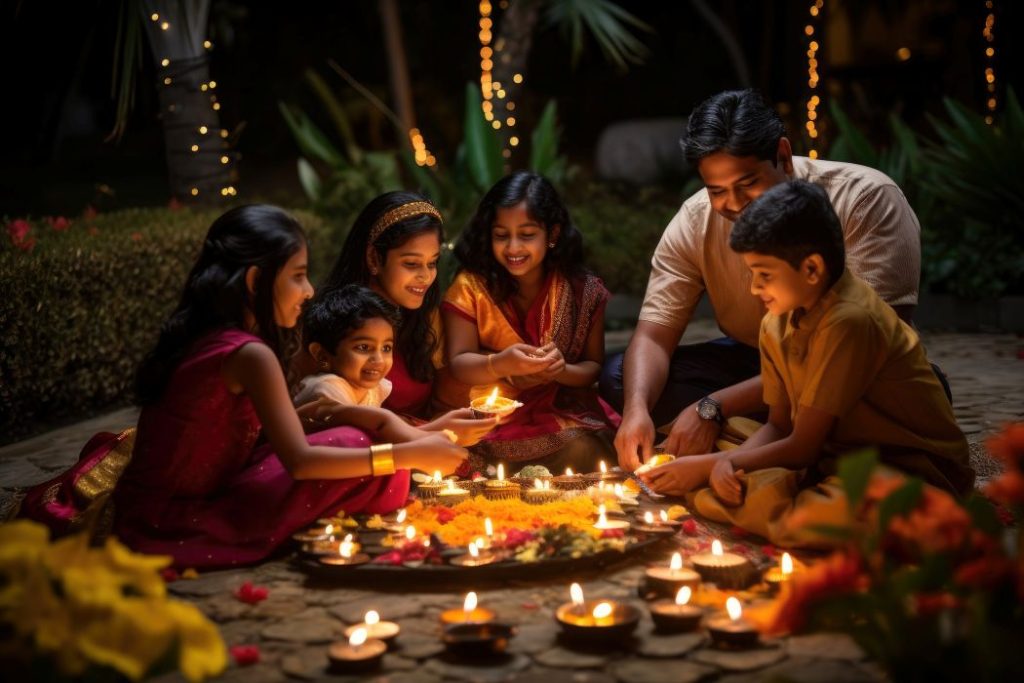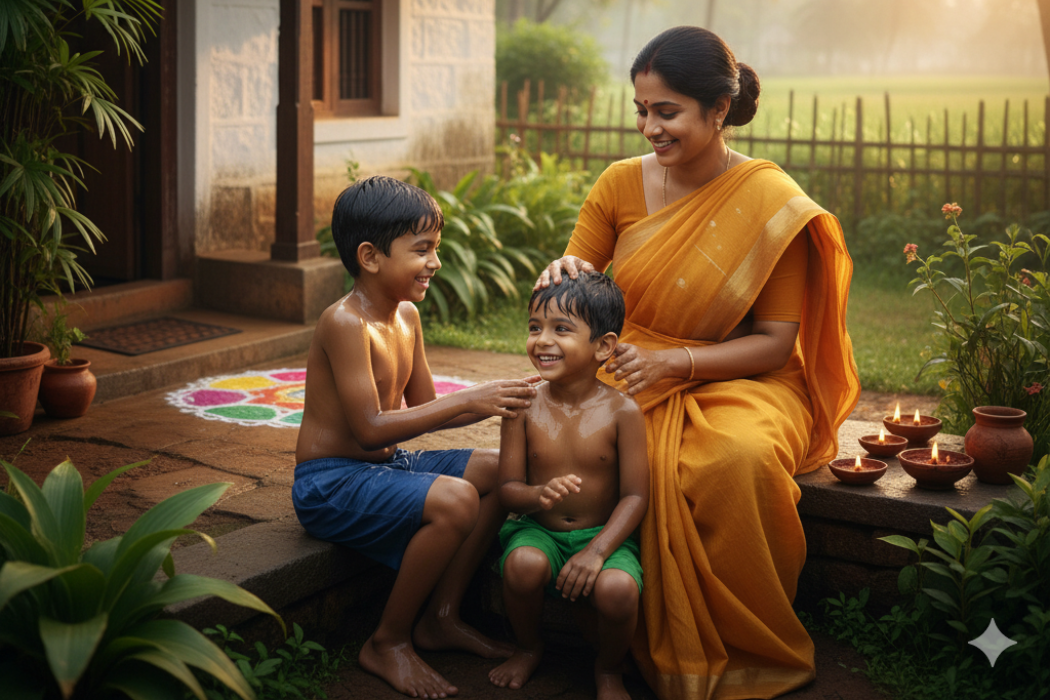The morning air is already buzzing. A delicious aroma of fresh chicken curry and crispy tosai fills the house. Festive decorations adorn the home, cookie jars filled with assorted cookies, and the promise of new clothes and happy family visits hangs in the stillness.
Deepavali is finally here! And it all begins with the sacred oil bath.
For Malaysian Indians, this ennai kuliyal (oil bath) on Deepavali mornings is far more than just a cleansing routine; it is a sacred cleansing ritual rooted in centuries of Vedic tradition. In the midst of the Deepavali rush, this ritual offers parents and families a dedicated moment to pause, purify, and physically and mentally reset for the year ahead.
Crucially, it ensures that children don’t just see a routine but experience a gentle moment of connection to their heritage, embracing calm, and feeling the deep love in every mindful touch.
Washing Away the Negativity: The Spiritual Significance
According to Vedic tradition, while an oil bath is recommended weekly, it is essential on Deepavali day for everyone, regardless of age or gender. This sacred ritual is a complete spiritual cleanse, representing a new start by eliminating accumulated inner darkness, including ego, struggle, and hatred. Think of it as an opportunity for emotional release and personal renewal, inviting in light, clarity, and peace instead.
Deepening its spiritual weight, a key belief holds that on this morning, Goddess Lakshmi resides in the oil, making the bath sacred for removing bad luck and ushering in blessings and prosperity. Ultimately, this act, tied to Lord Krishna’s victory over Narakasura, the very event people celebrate as Deepavali, is a powerful symbolic way to wash away all impurities, priming the mind and body to receive the light and joy of the festival.
This sacred oil bath ritual is a complete spiritual cleanse, representing a new start by eliminating accumulated inner darkness, including ego, struggle, and hatred.
Deep Ayurvedic Benefits of Oil Bath
Traditionally, gingelly oil is used for this purpose. Beyond its symbolic value, this oil offers a host of real physical and emotional benefits for both adults and children:
 Mind & Stress Relief
Mind & Stress Relief
Massaging the head with warm oil calms the mind, relieves stress, and promotes deep relaxation. This leads to enhanced mental clarity and helps busy parents get deep, restorative sleep.
Physical Strength & Immunity
The oil helps balance the body’s doshas and improves blood circulation. For children, the massage strokes actively help to strengthen bones and muscles for healthy growth, while regular oil application stimulates the immune system to defend against seasonal illnesses.
Skin Health & Detoxification
Applying oil from top to bottom moisturises, removes dead skin cells, and acts as a full-body detox. It also makes the body warm and protected against seasonal change.
Digestive Comfort & Sleep (Especially for Little Ones)
The ritual’s calming effect promotes deeper, more restful sleep for everyone. For infants and toddlers, gentle abdominal massage helps relieve common issues like colic, gas, and constipation, ensuring better rest and overall comfort.
Emotional Connection
The warm oil and gentle, consistent touch serve as a powerful form of tactile stimulation, profoundly reinforcing the bond of trust and love between parent and child.
Did You Know?
🪔 The oil bath, known as ennai kuliyal, is said to remove negative energy and purify the body and mind.
🌞 It is traditionally taken before sunrise to mark the symbolic victory of light over darkness.
💫 Goddess Lakshmi is believed to reside in the oil on Deepavali morning, bringing good fortune to the home.
🌿 Gingelly (sesame) oil is prized for its Ayurvedic properties. It warms, nourishes, and strengthens the body.
👶 Babies often receive their first Deepavali oil bath as a gentle blessing of health and protection.
Perfecting the Sacred Steps
For the best physical and spiritual benefits, the method of the oil bath is key. Parents can guide their children and embrace this practice for themselves with these simple steps:
- Warm the Elixir: Gently warm the Gingelly oil. The warmth itself is soothing and enhances the oil’s ability to penetrate the skin.
- Mindful Anointing: The head of the family applies a few drops of oil to the child’s hair/crown/feet with a simple blessing for health and prosperity.
- The Absorption: Leave the oil on the body for 15–30 minutes. This is crucial. It allows the oil to moisturise, cleanse toxins, relieve stress, and improve blood circulation. This is the time to sit quietly or offer simple morning prayers.
- The Cleansing: Use warm water and a traditional cleansing powder (like shikkakai or turmeric) to wash off the oil thoroughly.
- The Transformation: Only after this cleansing is complete do the family members put on their clean, crisp, beautiful new Deepavali attire.
Bonding Through Tradition: The Deepavali Oil Bath Experience
While the Deepavali oil bath holds deep spiritual meaning, it’s also a beautiful opportunity for families to slow down and reconnect. The beauty of this tradition lies in its simplicity; it requires presence, not performance. When parents or elders apply a few drops of oil and gently massage a child’s scalp, arms, or feet, it becomes an intimate act of love and mindfulness. These quiet, tactile moments, often lost in the rush of festive preparations, can create a sense of calm, grounding both parent and child in togetherness.
It shows kids that preparing for celebration begins with nurturing themselves first, honouring the body, mind, and spirit long before the sweets, fireworks, and new clothes arrive.

What the Oil Bath Teaches Our Children
- Patience: Learning to slow down and enjoy the ritual.
- Mindfulness: Paying attention to sensations, warmth, and calm.
- Gratitude: Beginning the day with a thankful heart.
- Self-Care: Understanding that taking care of our body and mind is sacred.
- Connection: Feeling loved and cared for through gentle, intentional touch.
Norsharmila Mohd Zin
Affectionately known as Sharmi, she’s a writer who swapped 11 years of career complacency for her dream job as a wordsmith. Though she’s not (yet!) a parent, Sharmi brings a fresh, unique perspective to the parenting conversation—like the quirky friend who always has a witty take on things. A proud cat mom to three fur babies and an endlessly cool aunt to her nephew, she’s all about exploring the ups, downs, and surprises of parenthood with humour and heart, proving that you don’t have to be a parent to appreciate and celebrate the beauty of raising little humans.















